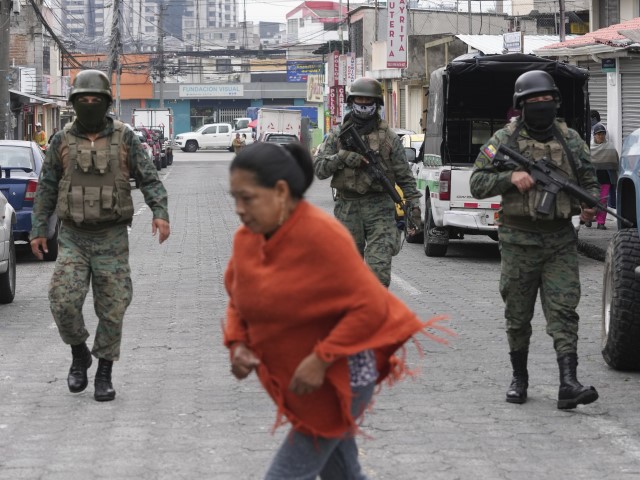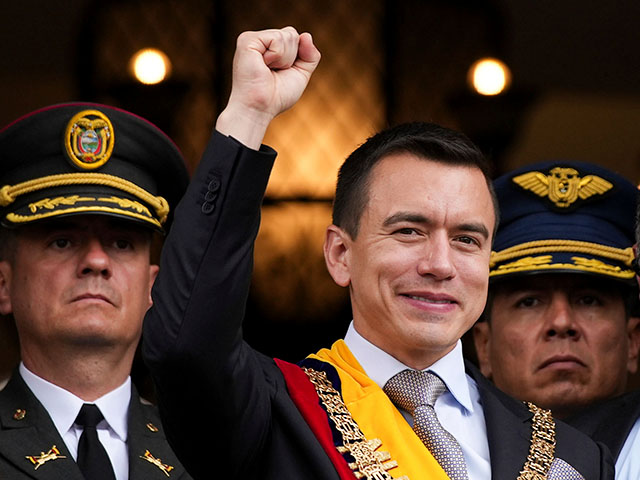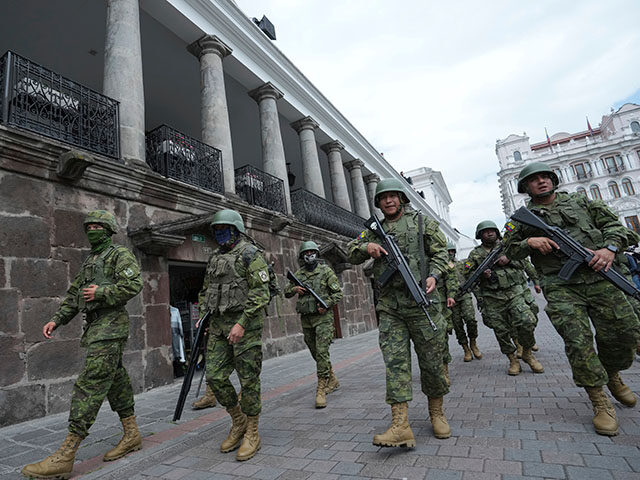The government of Ecuador formally declared an emerging gang war in the country an “internal armed conflict” on Wednesday, vowing to curtail the deadly violence that dramatically intensified the day before.
The terrorist actions committed by Ecuador’s criminal gangs on Tuesday — which included kidnappings, prison riots, and the use of explosive devices against civilian and police vehicles — left at least ten dead, including two policemen. On early Wednesday morning, police authorities found a burned vehicle with three burned people inside in a Guayaquil neighborhood.

Soldiers patrol the perimeter of Inca prison during a state of emergency in Quito, Ecuador, Tuesday, January 9, 2024, in the wake of the apparent escape of a powerful gang leader from prison. (Dolores Ochoa/AP)
The internal conflict decree designates over 20 of Ecuador’s most dangerous criminal gangs as military targets, allowing the nation’s armed forces to conduct operations to “neutralize” them. The decree goes hand in hand with a 60-day state of emergency declaration and curfew President Daniel Noboa approved this week.
Noboa signed the decree on Tuesday afternoon shortly after a group of armed hooded men stormed the local news channel TC Television in Guayaquil, kidnapping all of the channel’s staff.
Local police were able to successfully free staffers, capturing 13 men in the process now facing charges of terrorism.
The commander of Ecuador’s Armed Forces, Jaime Vela, told the nation in a brief speech that the military would not negotiate with terrorists and the gang’s violent actions would not deter a military crackdown.
“The President of the Republic, Daniel Noboa, through [the decree] established a very clear mission for us: from this moment on, every terrorist group identified in the mentioned decree has become a military objective,” Vela said. “The present and the future of our homeland are at stake.”
Noboa told Radio Canela on Wednesday morning that his government remains firm despite the difficult situation that Ecuador is presently facing, asserting that “the times of lukewarm governments are over.”
“We cannot fight this from only one side, and it is not only bullets, it is also in the Judicial Function. We will consider judges and prosecutors who support identified leaders of these terrorist groups also as part of the terrorist group,” Noboa said.

Newly sworn-in President Daniel Noboa waves from a balcony of the Carondelet presidential palace in Quito, Ecuador, Thursday, Nov. 23, 2023. (AP Photo/Carlos Noriega)
Lawmakers from all political parties currently represented in Ecuador’s National Assembly issued a public declaration in which they expressed their united support of the government’s actions to crack down on the criminal gangs.
The lawmakers agreed to provide pardons and/or amnesties to members of the Armed Forces and police personnel who fight against Ecuador’s criminal gangs should they require it.
“We find ourselves working in unity, regardless of the different political and ideological currents that we represent. The current situation requires collaboration and cohesion,” Henry Kronfle, head of Ecuador’s National Assembly, said on Tuesday. “We are committed to jointly addressing this challenge responsibly.”
Other Latin American countries have also expressed their support to the Ecuadorian government, including providing police or military aid to help fight the gangs. Argentine Security Minister Patricia Bullrich defined Ecuador’s situation as a “continental issue” on Tuesday, stating that Argentina is willing to send security forces to assist Ecuador.
Peruvian President Dina Boluarte declared a state of emergency in Peru’s border regions with Ecuador, reinforcing their police presence to help improve security.
Local media reported on Wednesday morning that private supermarkets are offering free food and supplies to the military to collaborate in their deployment against violent gangs.
Ecuador has experienced growing criminal gang violence in the past decade. The South American nation was declared 2023’s most violent country in the region after it registered more than 8,000 violent deaths in that year, a dramatic increase from the over 4,500 violent deaths documented in 2022.
The latest wave of widespread gang violence erupted after Ecuador’s “most wanted criminal,” José Adolfo Macías, seemingly disappeared from his prison cell on Monday. Macías’ disappearance was immediately followed by widespread gang violence and prison riots. Inmates took control of five of Ecuador’s prisons and kidnapped its personnel.
At press time, there is little confirmed information on the current situation in Ecuador’s prisons following Monday’s wave of riots as the Ecuadorian government has not issued any official statements to update on the situation.
Christian K. Caruzo is a Venezuelan writer and documents life under socialism. You can follow him on Twitter here.

COMMENTS
Please let us know if you're having issues with commenting.